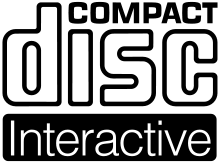Enhanced CD
Enhanced CD is a certification mark of the Recording Industry Association of America for various technologies that combine audio and computer data for use in both Compact Disc and CD-ROM players.[1]



Formats that fall under the "enhanced CD" category include mixed mode CD (Yellow Book CD-ROM/Red Book CD-DA), CD-i, CD-i Ready, and CD-Extra/CD-Plus (Blue Book, also called simply Enhanced Music CD or E-CD).[2]
The technology was popular in the late 1990s with the increase of computer usage. Music CDs often included music videos, wallpapers, and other various content. However, more recently, acts wishing to include enhanced content often include a DVD instead, with the disadvantage of it not playing in a CD audio player, but with the advantage of storing greater amounts of data and/or higher-quality video.
Problems
Sometimes computer CD-ripping programs (particularly cdparanoia and CDBurnerXP) have problems ripping some enhanced CDs, especially those that have the data in a separate section after the audio section. These CDs have the data 11,400 sectors (2m32s) after the audio, but some CD rippers may try to rip this blank section with the last track; the end result is that the ripper stalls during the last track or simply reports errors.
See also
References
- Certification Mark: Enhanced CD See What You Can Hear
- What is an Enhanced CD? Archived March 10, 2010, at the Wayback Machine